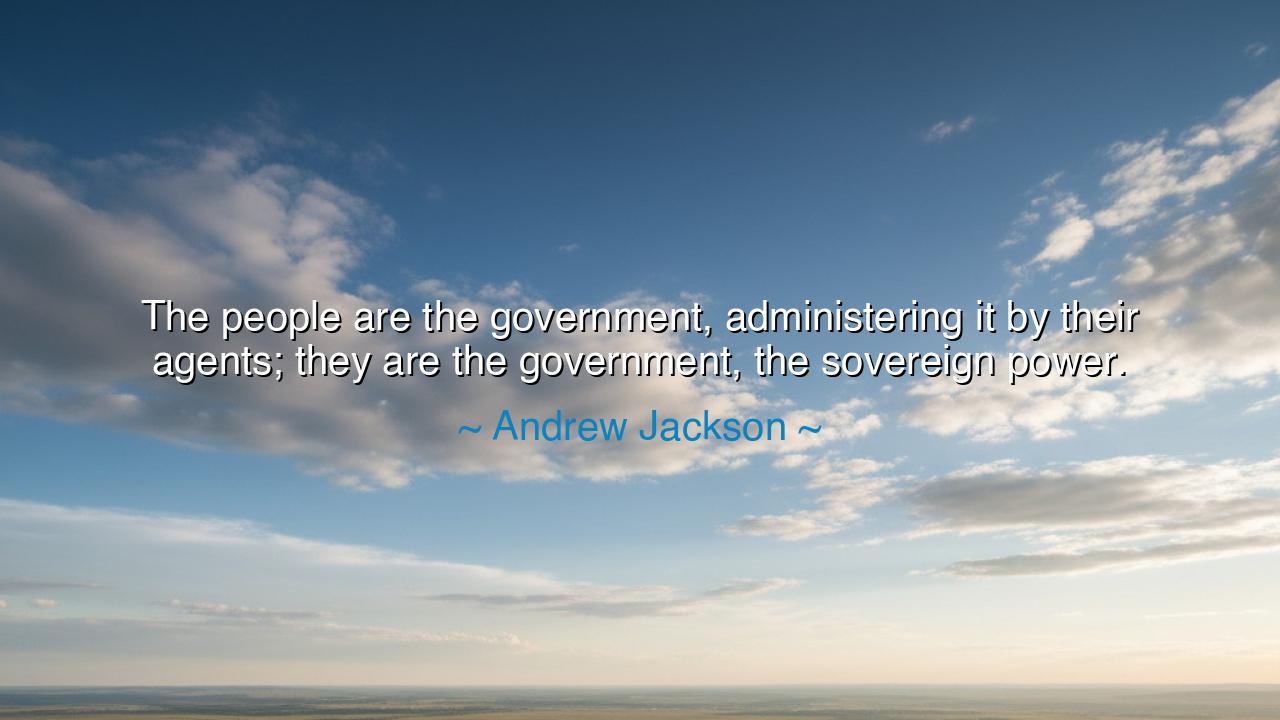
The people are the government, administering it by their agents;
The people are the government, administering it by their agents; they are the government, the sovereign power.






When Andrew Jackson declared, “The people are the government, administering it by their agents; they are the government, the sovereign power,” he was not uttering mere rhetoric — he was proclaiming a creed of democratic faith, a vision forged in the fires of revolution and carried forward into the heart of the young American republic. In these words, Jackson tore away the veil that separates ruler from ruled, reminding his nation that authority is not born from crowns or titles, but from the consent of the governed. His voice, rugged and unyielding, spoke for a generation that had fought to throw off monarchy, only to find new dangers in privilege and corruption. What he meant was simple yet sacred: that in a true democracy, sovereignty resides not in offices, but in the people themselves.
The origin of this quote lies in Jackson’s deep distrust of entrenched power. As the seventh President of the United States, born not to wealth but to struggle, he embodied the spirit of the common man. His rise was a defiance of aristocracy, a challenge to the notion that governance belonged only to the educated elite. During his presidency, he fought against the Bank of the United States, which he saw as a fortress of privilege standing above the reach of ordinary citizens. To Jackson, a republic that allowed institutions to control its people had already betrayed its founding promise. His statement was both a declaration and a warning — that if the people ever forgot their role as the true sovereigns, government would again become the master instead of the servant.
To call the people “the sovereign power” was revolutionary not merely in politics, but in spirit. For centuries, sovereignty had belonged to kings, emperors, and conquerors — men who claimed divine right to rule. Jackson’s words turned this divine order on its head. In his vision, the divine spark of authority dwells within every citizen, and government exists only to express their collective will. The president, the senator, the judge — all are but temporary agents, stewards of a power that does not belong to them. When they act against the people’s trust, they act against the very foundation of legitimacy. This idea, radical in its simplicity, transformed politics from a privilege of the few into a sacred duty of the many.
The truth of Jackson’s claim has been tested time and again in history. Consider the story of the American Civil Rights Movement a century later. When governments at local, state, and even federal levels turned their eyes away from justice, it was the people — men and women marching, protesting, and enduring imprisonment — who reclaimed the true meaning of sovereignty. In cities like Selma and Montgomery, citizens became the living embodiment of Jackson’s principle. Though beaten and scorned, they governed through their courage; they wielded no official title, yet their moral authority outweighed that of any lawmaker. Their movement proved that a government that betrays its people ceases to be legitimate, for sovereignty never dies in the hearts of the free.
Jackson’s words also reveal a deeper truth about responsibility. If the people are the government, then they are also accountable for the justice or injustice that flourishes under their watch. Freedom, he reminds us, is not a gift to be enjoyed in idleness; it is a fire that must be tended. When citizens grow apathetic, when they surrender their voices to demagogues or bureaucrats, the flame dims, and tyranny creeps back in, not by conquest, but by neglect. The greatest danger to democracy, Jackson warns, is not the power of kings — it is the silence of the people.
Even in modern times, his message remains as urgent as when he first spoke it. In an age where governments grow vast and impersonal, and the distance between ruler and ruled widens, Jackson’s voice calls us back to the ancient covenant of self-rule. To be a citizen is to be a guardian — of liberty, of law, of one’s neighbor’s dignity. It is to understand that no constitution, however wise, can save a nation whose people have forgotten their power. The health of a republic depends not on the brilliance of its leaders, but on the vigilance of its citizens.
The lesson of Jackson’s quote is timeless: never forget that the government is yours, and so is its burden. The people are not subjects but sovereigns — a truth both empowering and sobering. Each vote cast, each act of conscience, each word spoken in defense of truth strengthens the foundations of freedom. To govern well, one must not only expect integrity from leaders but demand it from oneself. For when the people stand watchful and united, the state becomes the servant of justice; but when they slumber, it becomes the master of their fate.
So let this teaching endure through the ages: the people are the heartbeat of government, the breath of liberty, and the soul of sovereignty. The halls of power may echo with the voices of the few, but the strength of a nation lives in the many — in the farmer, the worker, the teacher, the dreamer. As long as they remember that they are the government, no tyranny can stand against them, and no freedom can fade from their hands.






AAdministratorAdministrator
Welcome, honored guests. Please leave a comment, we will respond soon